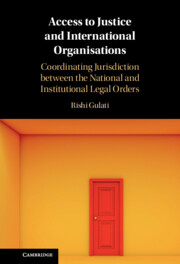 Access to Justice and International Organisations
Access to Justice and International Organisations Book contents
- Access to Justice and International Organisations
- Access to Justice and International Organisations
- Copyright page
- Contents
- Acknowledgements
- Abbreviations
- Introduction
- 1 International Organisations and Their Access to Justice Obligation
- 2 The Criteria for Assessing the Appropriateness of Dispute Resolution Mechanisms at International Organisations
- 3 Assessing Dispute Resolution Mechanisms at International Organisations
- 4 The Nature of Institutional Immunities
- 5 Realising Access to Justice in Claims against International Organisations
- Conclusion
Conclusion
Published online by Cambridge University Press: 10 March 2022
- Access to Justice and International Organisations
- Access to Justice and International Organisations
- Copyright page
- Contents
- Acknowledgements
- Abbreviations
- Introduction
- 1 International Organisations and Their Access to Justice Obligation
- 2 The Criteria for Assessing the Appropriateness of Dispute Resolution Mechanisms at International Organisations
- 3 Assessing Dispute Resolution Mechanisms at International Organisations
- 4 The Nature of Institutional Immunities
- 5 Realising Access to Justice in Claims against International Organisations
- Conclusion
Summary
If IOs comply with their international legal obligation to provide an appropriate mode of dispute resolution to private persons they impact, there will be little need for national courts to take jurisdiction in claims against IOs. An appropriate DRM must deliver justice independently, impartially and fairly. What precisely these key component fair trial guarantees require was set out in Chapter 2. That discussion can prove of much benefit to IOs wishing to establish fair trial compliant internal justice systems, as well as to all those who may be required to assess the quality of justice delivered at an institutional DRM. In the end, whether a dispute is resolved at an institutional DRM, through an arbitral process or through another mode of dispute resolution, justice must be delivered consistently with the right to a fair trial as developed in IHRL. This book does not state a preference for what type of DRM IOs should establish.
- Type
- Chapter
- Information
- Access to Justice and International OrganisationsCoordinating Jurisdiction between the National and Institutional Legal Orders, pp. 239 - 242Publisher: Cambridge University PressPrint publication year: 2022
